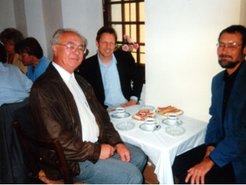Political Economy and Political Clientelism in the Agricultural and Industrial Region South of Leipzig
Political Economy and Political Clientelism in the Agricultural and Industrial Region South of Leipzig
Methods
Interviews
One of the most important components of the field research is a series of in-depth interviews with area residents, who report on their own experiences with property. Interview partners, who reside in different communities within the region, have been selected to represent a variety of perspectives on developments in agriculture, industry, small business, politics, and civic life. They include landowners, people who have experienced dispossession and displacement, former members of collective farms, managers and consultants of legal successors to collective farms, people who have started up new private farms, active and retired industrial workers, spokespersons for privatized industries, small business persons, local politicians and administrators, and civic activists.
Participant Observation

The primary site for participant observation is the town of Neukieritzsch, which is in many ways a characteristic settlement in the Southern Region of Leipzig. The focus on this single community is supplemented by repeated visits to contrasting communities, such as the industrial village of Lobstädt, the agricultural village of Großstolpen, and the regional centers of Borna and Groitzsch. Neukieritzsch was founded in 1842 as a station on the new railroad line between Leipzig and Altenburg. In the next century and a half, it became the home for two categories of persons: first, workers in the industrial complex of Böhlen/Lippendorf and, second, villagers whose homes fell victim to expanding surface mines. Neukieritzsch is now a local governmental center with a population of 3,000. Its administration is, however, also responsible for the affairs of an additional 4,000 persons in five neighboring villages. The foci of participant observation in Neukieritzsch are local politics, civic life, housing and gardening, and other aspects of everyday life.
Examination of Primary Sources
Data gathered through interviews and participant observation are supplemented by data found in a variety of primary sources, including archival records, local newspapers, and publications of government agencies, business enterprises, and interest groups.
Household Survey
The last phase of field research will be devoted to conducting a survey of households in the community of Neukieritzsch. The point of the survey will be to determine the make-up of households, the geographical origin, education, and occupation of their members, the history of their integration into the local labor market, their access to physical, monetary, and human resources, and the use that they make of these resources. It is anticipated that the quantitative analysis of property relations in a single community will provide a supplement to and a check on qualitative data gathered through ethnographic fieldwork. Neukieritzsch is a suitable choice for such a survey, since its mixed population includes representatives of various economic sectors in a proportion that matches that of the wider region. The survey will be administered to a random sample of local residents by a team made up of the project head and student assistants.
